| Listing 1 - 10 of 12 | << page >> |
Sort by
|
Book
ISBN: 1920942432 9781920942434 1920942424 Year: 2006 Publisher: Canberra, Australia : ANU E Press,
Abstract | Keywords | Export | Availability | Bookmark
 Loading...
Loading...Choose an application
- Reference Manager
- EndNote
- RefWorks (Direct export to RefWorks)
Ulama --- Community leadership --- Ummah (Islam) --- Community life --- Community power --- Leadership --- Ulema --- Islam --- Muslim scholars --- Umma (Islam) --- Islam and state --- Functionaries --- N.U. (Organization). --- Java (Indonesia) --- Politics and government. --- Djawa (Indonesia) --- Jawa (Indonesia) --- Pulau Jawa (Indonesia) --- Greater Sunda Islands
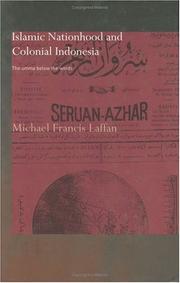
ISBN: 0415297575 1280402784 0203222571 9780203222577 9781134430819 1134430817 9780415297578 9786610402786 6610402787 9780415444354 0415444357 9781280402784 9781134430772 9781134430826 Year: 2003 Publisher: London New York RoutledgeCurzon
Abstract | Keywords | Export | Availability | Bookmark
 Loading...
Loading...Choose an application
- Reference Manager
- EndNote
- RefWorks (Direct export to RefWorks)
Arguing that Indonesian nationalism rested on Islamic ecumenism, heightened by colonial rule and the pilgrimage, the author contrasts the latter experience with life in Cairo, where some Southeast Asians were drawn to both reformism and nationalism.
Islam and politics --- Nationalism --- Southeast Asians --- Ummah (Islam) --- History. --- Indonesia --- Politics and government --- History --- Islam --- Politics and Islam --- Southeastern Asians --- Umma (Islam) --- Political aspects --- Political science --- Asians --- Ethnology --- Islam and state
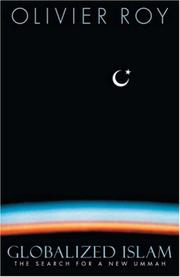
ISBN: 9780231134996 0231134991 0231134983 9780231134989 Year: 2004 Publisher: New York Columbia university press
Abstract | Keywords | Export | Availability | Bookmark
 Loading...
Loading...Choose an application
- Reference Manager
- EndNote
- RefWorks (Direct export to RefWorks)
#SBIB:316.331H421 --- #SBIB:316.331H330 --- #SBIB:39A10 --- Morfologie van de godsdiensten: Islam --- Godsdienst en politiek: algemeen --- Antropologie: religie, riten, magie, hekserij --- #SBIB:39A10Morfologie van de godsdiensten: Islam --- Globalization --- Islam and politics --- Ummah (Islam) --- Umma (Islam) --- Islam --- Islam and state --- Global cities --- Globalisation --- Internationalization --- International relations --- Anti-globalization movement --- Religious aspects&delete& --- Islamic countries --- Politics and government. --- Religious aspects
Book
ISBN: 9780674987838 0674987837 Year: 2019 Publisher: Cambridge The Belknap Press, Harvard University Press
Abstract | Keywords | Export | Availability | Bookmark
 Loading...
Loading...Choose an application
- Reference Manager
- EndNote
- RefWorks (Direct export to RefWorks)
The Arab Spring precipitated a crisis in political Islam. In Egypt Islamists have been crushed. In Turkey they have descended into authoritarianism. In Tunisia they govern but without the label of "political Islam." Andrew March explores how, before this crisis, Islamists developed a unique theory of popular sovereignty, one that promised to determine the future of democracy in the Middle East. This began with the claim of divine sovereignty, the demand to restore the sharīʻa in modern societies. But prominent theorists of political Islam also advanced another principle, the Quranic notion that God's authority on earth rests not with sultans or with scholars' interpretation of written law but with the entirety of the Muslim people, the umma. Drawing on this argument, utopian theorists such as Abū'l-Aʻlā Mawdūdī and Sayyid Quṭb released into the intellectual bloodstream the doctrine of the caliphate of man: while God is sovereign, He has appointed the multitude of believers as His vicegerent. The Caliphate of Man argues that the doctrine of the universal human caliphate underpins a specific democratic theory, a kind of Islamic republic of virtue in which the people have authority over the government and religious leaders. But is this an ideal regime destined to survive only as theory?--
Islam and politics --- Islam and state --- Ummah (Islam) --- Caliphate --- Islamic fundamentalism --- Islamic countries --- Politics and government --- Fundamentalism, Islamic --- Islamism --- Islam --- Religious fundamentalism --- Khalifat --- Khilāfah --- Khilafat --- Caliphs --- Kings and rulers --- Mosque and state --- State and Islam --- State, The --- Politics and Islam --- Political science --- Umma (Islam) --- Political aspects --- Politics and government. --- Political philosophy. Social philosophy --- Islamic countries - Politics and government
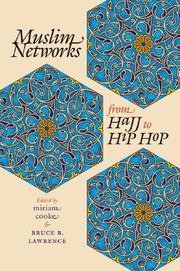
ISBN: 0807876313 9780807876312 0807829234 9780807829233 080785588X 9780807855881 9798890879332 Year: 2005 Publisher: Chapel Hill University of North Carolina Press
Abstract | Keywords | Export | Availability | Bookmark
 Loading...
Loading...Choose an application
- Reference Manager
- EndNote
- RefWorks (Direct export to RefWorks)
This volume selects major moments and key players from the seventh century to the twenty-first that have defined Muslim networks as the building blocks for Islamic identity and social cohesion. The essays provide a long view of Muslim networks, correcting both scholarly omission and political sloganeering.
Islam. --- Panislamism. --- Ummah (Islam). --- Social Science. --- Religion. --- Islam --- Panislamism --- Ummah (Islam) --- #SBIB:054.AANKOOP --- #SBIB:316.331H421 --- #SBIB:316.7C130 --- Umma (Islam) --- Islam and state --- Pan-Islamism --- Arabism --- Mohammedanism --- Muhammadanism --- Muslimism --- Mussulmanism --- Religions --- Muslims --- Computer network resources --- Morfologie van de godsdiensten: Islam --- Groepscultuur en subculturen --- Islam - 21st century --- Islam - Computer network resources
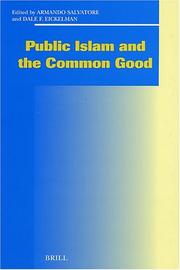
ISSN: 13853376 ISBN: 9786610467914 1423711807 9047402820 1280467916 1281458252 9786611458256 9781423711803 9789047402824 9789004136212 9004136215 9004136215 9004156224 9789004156227 6610467919 9781280467912 9781281458254 6611458255 Year: 2006 Volume: 95 Publisher: Leiden Boston Brill
Abstract | Keywords | Export | Availability | Bookmark
 Loading...
Loading...Choose an application
- Reference Manager
- EndNote
- RefWorks (Direct export to RefWorks)
This book explores the public role of Islam in contemporary world politics. "Public Islam" refers to the diverse invocations and struggles over Islamic ideas and practices that increasingly influence the politics and social life of large parts of the globe. The contributors to this volume show how public Islam articulates competing notions and practices of the common good and a way of envisioning alternative political and religious ideas and realities, reconfiguring established boundaries of civil and social life. Drawing on examples from the late Ottoman Empire, Africa, South Asia, Iran, and the Arab Middle East, this volume facilitates understanding the multiple ways in which the public sphere, a key concept in social thought, can be made transculturally feasible by encompassing the evolution of non-Western societies in which religion plays a vital role.
Islam and civil society. --- Democracy --- Islam and state. --- Ummah (Islam) --- Umma (Islam) --- Islam --- Islam and state --- Mosque and state --- State and Islam --- State, The --- Civil society and Islam --- Civil society --- Religious aspects --- Islam. --- Islamic countries --- Politics and government. --- Democracy - Religious aspects - Islam. --- Islamic countries - Politics and government.

ISBN: 1135885249 1280175133 0203487478 9780203487471 9780415967853 0415967856 0415967856 9781135885199 9781135885236 9781135885243 9780415865081 1135885230 9781280175138 0415865085 Year: 2005 Publisher: New York
Abstract | Keywords | Export | Availability | Bookmark
 Loading...
Loading...Choose an application
- Reference Manager
- EndNote
- RefWorks (Direct export to RefWorks)
This book examines how an elite group of traditionists, historians and theologians shaped Muslims' perceptions of their prophet, their community and their behavior by retelling and interpreting the story of Muhammad's ascent to heaven (the mi'raj).
Islam --- Ummah (Islam) --- Umma (Islam) --- Islam and state --- Origin. --- Muḥammad, --- Mahomed, --- Maḥmūd, --- Mahomet, --- Mohammed, --- Magomet, --- Mu-han-mo-te, --- Nabi Muhammad, --- Mukhammed, --- Maometto, --- Mahometto, --- Mohammad, --- Mahoma, --- Muḥamad, --- מוחמד --- מוחמד, --- ، محمد --- النبي محمد --- محمد --- محمد الرسول --- محمد النبي --- محمد، نبي --- محمد، پيامبر --- محمد، --- محمدو --- محمد, --- محمد. --- ممحمد، --- Isrāʼ and Miʻrāj. --- محمد الرسول, --- محمد النبي, --- Muhammad, --- Isra and Miraj.
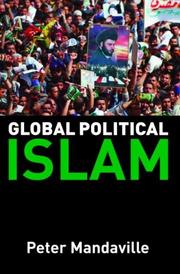
ISBN: 9780415326070 9780415326063 0415326060 0415326079 9780203358511 0203358511 Year: 2007 Publisher: London : Routledge,
Abstract | Keywords | Export | Availability | Bookmark
 Loading...
Loading...Choose an application
- Reference Manager
- EndNote
- RefWorks (Direct export to RefWorks)
Introduction: thinking about Islam and politics in global perspective -- Islam and politics: history and key concepts -- State formation and the making of Islamism -- Islam in the system: the evolution of Islamism as political strategy -- Islam as the system: Islamic states and Islamization from above -- Islam for lack of a system: Islamism in weak and failed states -- Radical Islamism and jihad beyond the nation-state -- Muslim transnationalism: brotherhoods, networks diasporas -- Who speaks for Islam? religious authority in the global Umma -- Beyond Islamism: globalization and Muslim politics -- Appendix: key economic & political indicators for Muslim countries
Islam and politics. --- Islam and international relations --- Islam et politique --- Islam et relations internationales --- Islam and politics --- Islam and state --- Globalization --- Ummah (Islam) --- Religious aspects --- Islam --- Islam and state. --- Islam. --- -Ummah (Islam) --- 320.557 --- Umma (Islam) --- Global cities --- Globalisation --- Internationalization --- International relations --- Anti-globalization movement --- Mosque and state --- State and Islam --- State, The --- Politics and Islam --- Political science --- -Islam --- Political aspects --- Ummah (Islam). --- Globalization - Religious aspects - Islam
Book
ISBN: 9781479800889 9781479800568 1479800880 1479800562 1479800902 1479800198 Year: 2014 Publisher: New York New York university press
Abstract | Keywords | Export | Availability | Bookmark
 Loading...
Loading...Choose an application
- Reference Manager
- EndNote
- RefWorks (Direct export to RefWorks)
"In Islam Is a Foreign Country, Zareena Grewal explores some of the most pressing debates about and among American Muslims: what does it mean to be Muslim and American? Who has the authority to speak for Islam and to lead the stunningly diverse population of American Muslims? Do their ties to the larger Muslim world undermine their efforts to make Islam an American religion? Offering rich insights into these questions and more, Grewal follows the journeys of American Muslim youth who travel in global, underground Islamic networks. Devoutly religious and often politically disaffected, these young men and women are in search of a home for themselves and their tradition. Through their stories, Grewal captures the multiple directions of the global flows of people, practices, and ideas that connect U.S. mosques to the Muslim world. By examining the tension between American Muslims' ambivalence toward the American mainstream and their desire to enter it, Grewal puts contemporary debates about Islam in the context of a long history of American racial and religious exclusions. Probing the competing obligations of American Muslims to the nation and to the umma (the global community of Muslim believers), Islam is a Foreign Country investigates the meaning of American citizenship and the place of Islam in a global age. Zareena Grewal is Assistant Professor of American Studies and Religious Studies at Yale University and Director for the Center for the Study of American Muslims at the Institute for Social Policy and Understanding"--
Muslim youth --- Islam --- Ummah (Islam) --- Social integration --- Attitudes --- Religious life --- United States --- Ethnic relations --- #SBIB:316.331H300 --- #SBIB:316.331H421 --- Umma (Islam) --- Islam and state --- Islamic youth --- Youth, Muslim --- Youth --- Attitudes. --- Godsdienst en samenleving: algemeen --- Morfologie van de godsdiensten: Islam --- Ethnic relations. --- SOCIAL SCIENCE / Anthropology / General. --- RELIGION / General. --- SOCIAL SCIENCE / Customs & Traditions. --- Muslim youth - United States - Attitudes --- Muslim youth - Religious life - United States --- Islam - United states --- Social integration - United States --- United States - Ethnic relations

ISBN: 1850655936 1850655987 9781850655985 Year: 2004 Publisher: London Hurst
Abstract | Keywords | Export | Availability | Bookmark
 Loading...
Loading...Choose an application
- Reference Manager
- EndNote
- RefWorks (Direct export to RefWorks)
Renouveau islamique --- Globalization --- Islam and politics --- Islamic fundamentalism --- Islamic renewal --- Ummah (Islam) --- 297 --- #SBIB:054.AANKOOP --- #SBIB:316.331H330 --- #SBIB:316.331H421 --- #SBIB:321H91 --- Umma (Islam) --- Islam --- Islam and state --- Islamic reform --- Islamic revivalism --- Islamic revivalist movement --- Ṣaḥwah (Islam) --- Religious awakening --- Wahhābīyah --- Fundamentalism, Islamic --- Islamism --- Religious fundamentalism --- Global cities --- Globalisation --- Internationalization --- International relations --- Anti-globalization movement --- Religious aspects&delete& --- Godsdienst en politiek: algemeen --- Morfologie van de godsdiensten: Islam --- Niet-specifieke politieke en sociale theorieën vanaf de 19e eeuw: islam, Arabisch nationalisme --- Islam. Mohammedanisme --- Reform --- Renewal --- Islamic countries --- Politics and government. --- Religious aspects --- Politics and government --- Islam. --- Islamic fundamentalism. --- Islamic renewal. --- Mondialisation --- Islam et politique --- Intégrisme islamique --- Aspect religieux --- Pays musulmans --- Politique et gouvernement --- Globalization - Religious aspects - Islam --- Islam and politics - Islamic countries --- Ummah (Islam) - Islamic countries --- Islamic fundamentalism - Islamic countries --- Islamic renewal - Islamic countries --- Islamic countries - Politics and government
| Listing 1 - 10 of 12 | << page >> |
Sort by
|

 Search
Search Feedback
Feedback About UniCat
About UniCat  Help
Help News
News